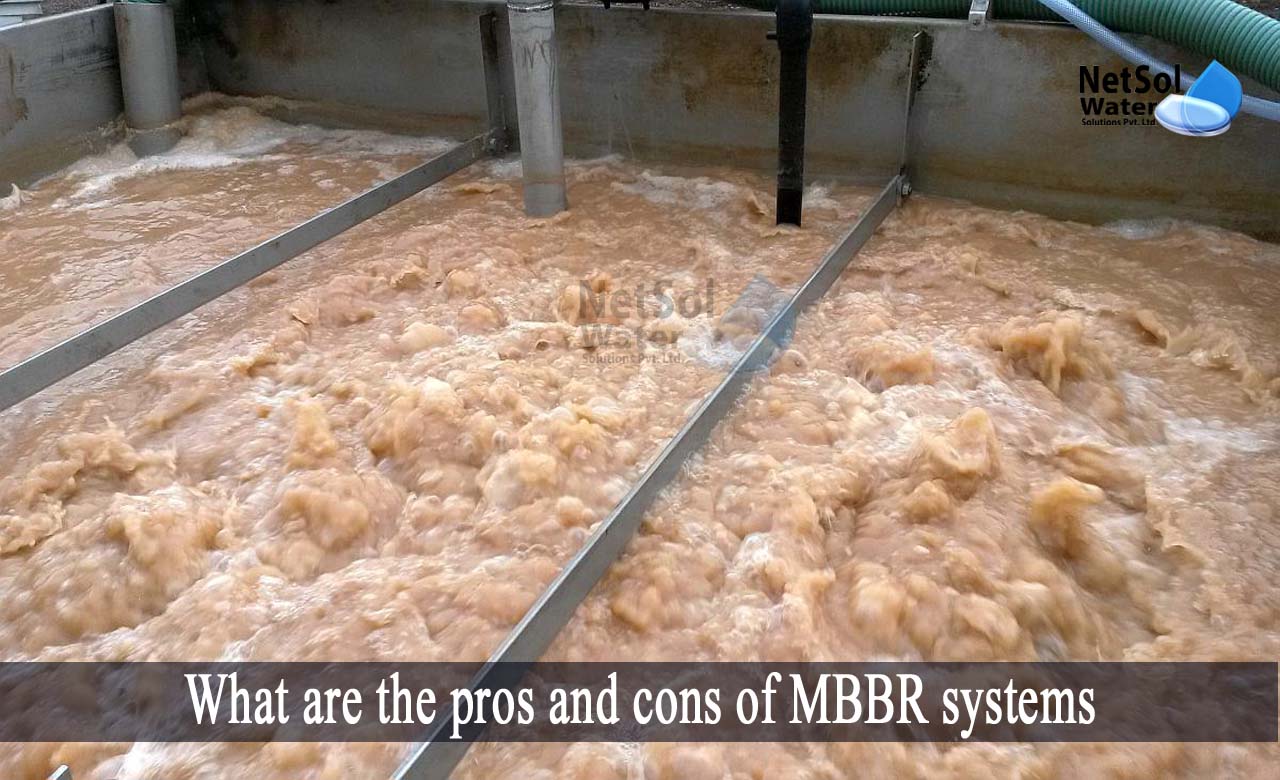What are the pros and cons of MBBR systems?
A moving bed bioreactor (MBBR) is a method of biological sewage treatment. In many cases, wastewater contains organic matter that is difficult to remove using physical or chemical means. Thus, one of the greatest ways to deal with organic matter is to use a biological process. The primary principle behind biological water treatment systems is to break down sewage, using microorganisms.
MBBR incorporates characteristics of each of these technologies and their related benefits, while avoiding their drawbacks.
Pros of MBBR systems
1: It reduces the hydraulic retention time (HRT)
The hydraulic retention time is the amount of time required by the bioreactor, to successfully treat the wastewater influent. HRT for these moving bed bioreactor systems is shorter than for others, due to the combination of moving carriers and highly concentrated biofilm, generally only requiring a few hours at maximum based on organic load.
2: It reduces sludge production
The resulting sludge following certain operations is one of the most serious issues, when dealing with wastewater. Biological systems are no exception. However, because MBBR is a fixed film system, no effluent is added, hence, the sludge volume produced is lower than in additive biological processes.
3: It requires less space
Moving bed bioreactor units are more compact and occupy less land space, than other biological treatment systems, due to the huge inner surface area of the plastic carriers, and the high bacterial concentration of the biofilm.
4: It responds to changes in load without the need for operator interaction
Many alternative treatment modalities, biological or otherwise, must be meticulously monitored for load fluctuations, in order to adjust dosages correctly. This is unnecessary with MBBR for fluctuations that aren't particularly large. The biofilm can spontaneously self-adjust to accept varied volumes, concentrations, or pollutants.
5: There is an increased effective sludge retention time (SRT)
The amount of time that a certain unit of biological media is actively operating, within the bioreactor, is referred to as sludge retention time. The SRT of MBBR is substantially longer as a fixed film system, than that of a suspended growth system where the bio-medium can be removed from the reactor, at the outlet.
Such systems necessitate a sludge recirculation line. The plastic carriers in the moving bed bioreactor process are held within the reactor, by a mesh screen at the outflow, ensuring that no biofilm is lost.
6: There is a toxic shock resistance
MBBR systems, like their responsiveness to load changes, are also resistant to toxic shock, which is a problem with other biological treatments. Some wastewater contaminants can kill bacteria on biological media, however, MBBR can adapt to and recover from such toxins.
7: Process performance without the use of a supplementary clarifier
Re-circulated sludge is used in activated sludge systems to enhance SRT. However, if there are problems with the clarifier's separation, the return sludge may be of lower quality, affecting the reactor's performance.
This is not an issue in MBBR systems, because recirculation is not required.
8: It has better settling qualities
The quality of the treated water can be affected, by how effectively the reactor effluent settles in the clarifying tank.
This can be a problem in conventional biological treatment systems, but MBBR systems, with their combined fixed film and suspended medium properties, ensure that the solids settle off well, with no turbidity and low water content in the sludge.
Cons of MBBR systems
1:It requires manual bacterial monitoring
Biological systems require greater monitoring than other treatments. You cannot just place a sensor in the tank to keep track of the bacteria, in the bio-medium on a constant basis. Operators must take samples of the media on a regular basis and manually test them in a lab, to guarantee that the bacteria are alive and healthy.
2:Skilled operators are required
The operators must be experts in biological water treatment in order to monitor the bio media. The physical operation of these systems is not extremely complex, but the biological processes that occur are complex, and necessitate the use of expert personnel to assure optimal operation.
Conclusion
MBBR treatment systems combine some of the greatest attributes of the biological treatment systems, while avoiding their drawbacks, but it has some of their own. However, in some cases and applications, the benefits can outweigh the drawbacks.
How can we assist?
Netsol Water is a well-known enterprise that offers superior treatment solutions for wastewater, and water. We provide all physical, chemical, and biological processes, as well as MBR, MBBR, Activated Carbon, electrocoagulation, reverse osmosis systems, etc.
Netsol Water is Greater Noida-based leading water & wastewater treatment plant manufacturer. We are industry's most demanding company based on client review and work quality. We are known as best commercial RO plant manufacturers, industrial RO plant manufacturer, sewage treatment plant manufacturer, Water Softener Plant Manufacturers and effluent treatment plant manufacturers. Apart from this 24x7 customer support is our USP. Call on +91-9650608473, or write us at enquiry@netsolwater.com for any support, inquiry or product-purchase related query.



